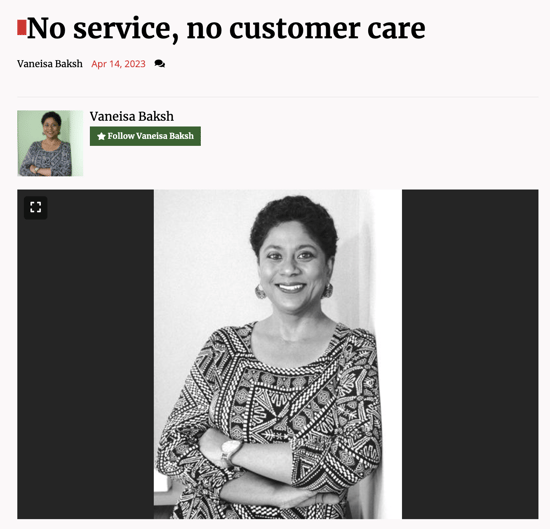Due to a rapidly changing business landscape, manufacturing companies face several challenges today. These challenges range from intense competition, rising costs, shrinking markets and margins, changing customer preferences and demand, changes in technology, and many more, significantly impacting a company's bottom line and long-term viability.
While we have seen companies try new creative ways to stay competitive, one area or strategy often overlooked by manufacturing companies is developing and implementing a Customer Relationship Management (CRM) strategy.
In Trinidad and Tobago, most markets are already established and customers tend to have certain preferences or biases towards specific brands or providers. However, providing exceptional customer experiences in this region can be quite challenging. Even companies with long-standing service histories and well-known brands have to exert more effort in retaining their customers and exploring new markets to expand their reach.
This is where a solid customer relationship strategy comes into play, which we will discuss in this article.
What Is A Customer Relationship Management (CRM) Strategy?
A CRM strategy is a business approach that focuses on managing customer relationships to increase sales, improve customer satisfaction, and grow the organisation's overall profitability.
It looks at achieving all of this through the perspective of the customer and the management of customer relationships in three stages;
- Before the Sale (Marketing)
- During the Sale (Sales Engagement)
- After the Sale (Customer Experience + Satisfaction)
A well-designed CRM strategy brings all three departments together to focus on the common goals and objectives of the organisation, which is growth.
We've been around for 35 years, and we are well known; however, our revenues have been falling by approximately $2M - $3M each year over the last few years - (Director in Office Equipment Industry)
The Impact of No CRM Strategy
If we look at how most companies today, it's apparent that there is some complacency as it relates to executives thinking that their tenure/legacy will be enough to maintain sales. While this does have some merit, tenure is not enough of a business strategy, especially with the younger generations.
Without a CRM strategy, organisations tend to face several negative impacts that impede business growth. Here are a few examples:
- Poor customer service
- Inefficient sales processes
- Inaccurate forecasting
- Difficulty identifying opportunities
- Lack of insight into customer behaviour.
Sometimes, these negative impacts impede business growth by reducing customer retention, sales revenue, and operational efficiency.
Benefits of CRM Strategy in the Manufacturing Industry
- Improved Customer Service: A CRM strategy enables manufacturing companies to provide excellent customer service by streamlining communication, reducing response times, and providing accurate information to internal and external teams.
- Better Decison-Making: A well-designed CRM system provides real-time data and insights that can be used to make better business decisions.
- Enhanced Collaboration: A CRM system enables manufacturers to collaborate more effectively with suppliers, partners, and customers, leading to more successful outcomes.
- Increased Sales: A CRM strategy helps manufacturers identify opportunities and leads, track sales processes, and close deals more efficiently.
How Can Manufacturers Get Started With Implementing a CRM Strategy?
While there is no one way, below is a step-by-step approach I believe manufacturers can adopt once they are committed to implementing a CRM strategy.
Step 1: Identify business goals and objectives
The first step in developing a CRM strategy is identifying business goals and objectives across all of your revenue-generating departments (Marketing, Sales and Service). This involves looking at the business areas that need improvement and setting goals that align with these areas.
For example, a company like Lifetime Roofing may recognise that they want to improve the order-to-fulfilment stage of their sales process, to either enhance an existing process and exceed customer expectations or to mitigate against customers cancelling orders because the item(s) are taking too long to be delivered. Their especially if their reps work on the field. Implementing some technology in this space will help solve this problem.

[Read Express Article] No Service No Customer Care by Vaneisa Baksh
Step 2: Identify Key Stakeholders
The next step is identifying key stakeholders in the developmental process of your CRM strategy. This may include sales and marketing teams, customer service representatives, IT personnel, operations and senior management.
Step 3: Analyse Customer Data
Once the stakeholders have been identified, the next step is to analyse customer data to identify trends, preferences, and behaviours. This data can be obtained from various sources, such as social media, customer surveys, and sales data or hiring an external consultant.
Step 4: Define Customer Segments
The next step is to define customer segments based on the customer data analysis. This involves grouping customers based on their preferences, behaviours, trends, needs, etc. Customer segments help in the development of personalised marketing and sales strategies.
Step 5: Develop a CRM Plan
The next step is developing a CRM plan based on customer data and segmentation. This plan should include a clear description of the company's CRM objectives, strategies for achieving those objectives, and the technology needed to support these strategies.
Step 6: Implement the CRM plan
Once the CRM plan has been developed, it is implemented. This involves selecting the appropriate CRM software and training employees to use it effectively.
Step 7: Monitor and evaluate
The final step is to monitor and evaluate the CRM strategy's effectiveness regularly. This involves collecting and analysing data on customer satisfaction, sales, and other relevant metrics.
Importance of Technology in Supporting a CRM Strategy in the Manufacturing Industry
Technology is critical in supporting a CRM strategy for manufacturers as it enables companies to collect, store, and analyse customer data more efficiently, which is essential for developing effective growth strategies.
CRM tools like chatbots, automation, sales templates, and strategically using email marketing software can also help improve communication and enhance sales and customer experiences during and after the sale.
Technology That Supports Your CRM Strategies
There are several CRM software options available for manufacturing companies to choose from. Here are some popular ones:
- Salesforce: Salesforce is one of the leading CRM platforms offering various features and solutions specifically designed for manufacturing companies. It provides tools for managing customer relationships, sales, marketing, and customer service.
- Microsoft Dynamics 365: Microsoft Dynamics 365 is a comprehensive CRM and ERP solution offering modules tailored explicitly to manufacturing companies. It includes sales automation, customer service management, and supply chain management.
- SAP CRM: SAP CRM is a robust CRM software solution that integrates with other SAP systems, providing a comprehensive end-to-end solution for manufacturing companies. It offers sales and service management, marketing automation, and customer analytics functionalities.
- Oracle CRM: Oracle CRM is a powerful CRM software suite with sales, marketing, and customer service modules. It offers industry-specific solutions for manufacturing companies, helping them streamline their sales processes and improve customer interactions.
- Zoho CRM: Zoho CRM is a cloud-based platform that offers various features for managing customer relationships, sales, and marketing. It provides customisation options, automation capabilities, and integration with other business applications.
- HubSpot CRM: HubSpot CRM is a user-friendly and scalable CRM software solution offering contact management, lead generation, and sales automation features. It also provides marketing automation tools and integrates with other HubSpot tools for a complete inbound marketing solution.
[Read Case Study] How A 100-Year-Old Company Deliveries Modern Customer Service Using HubSpot CRM.
These are just a few examples of CRM software options for manufacturing companies. It's important to carefully evaluate your manufacturing business's specific needs and requirements to choose a CRM software that aligns with your objectives and effectively supports your business processes.
Final Thoughts
As a manufacturing company, many obstacles can affect your success and sustainability. Fortunately, implementing a well-planned CRM strategy can be a game-changer. You can improve customer satisfaction, promote teamwork, and boost revenue by utilising a step-by-step process and involving key players. It's also essential to leverage technology to support your CRM efforts. With the right approach, your CRM strategy can help you achieve your business objectives and stay ahead of the competition.
👋🏾 Did You Find This Useful? Subscribe 👇🏾 To Learn More




COMMENTS